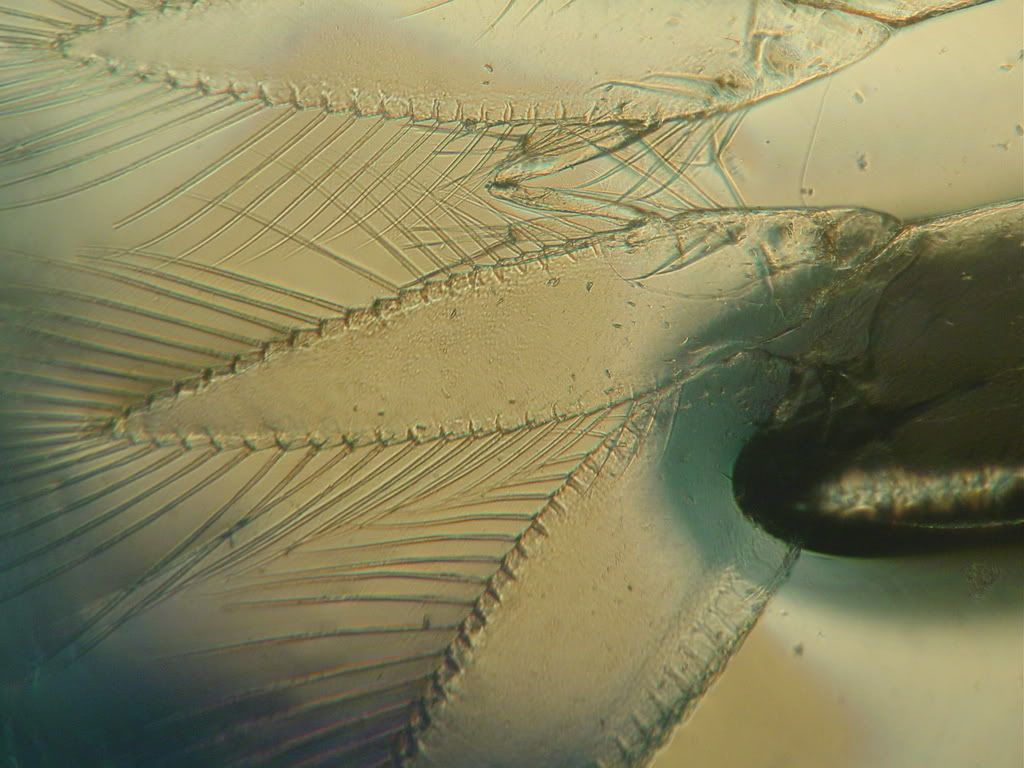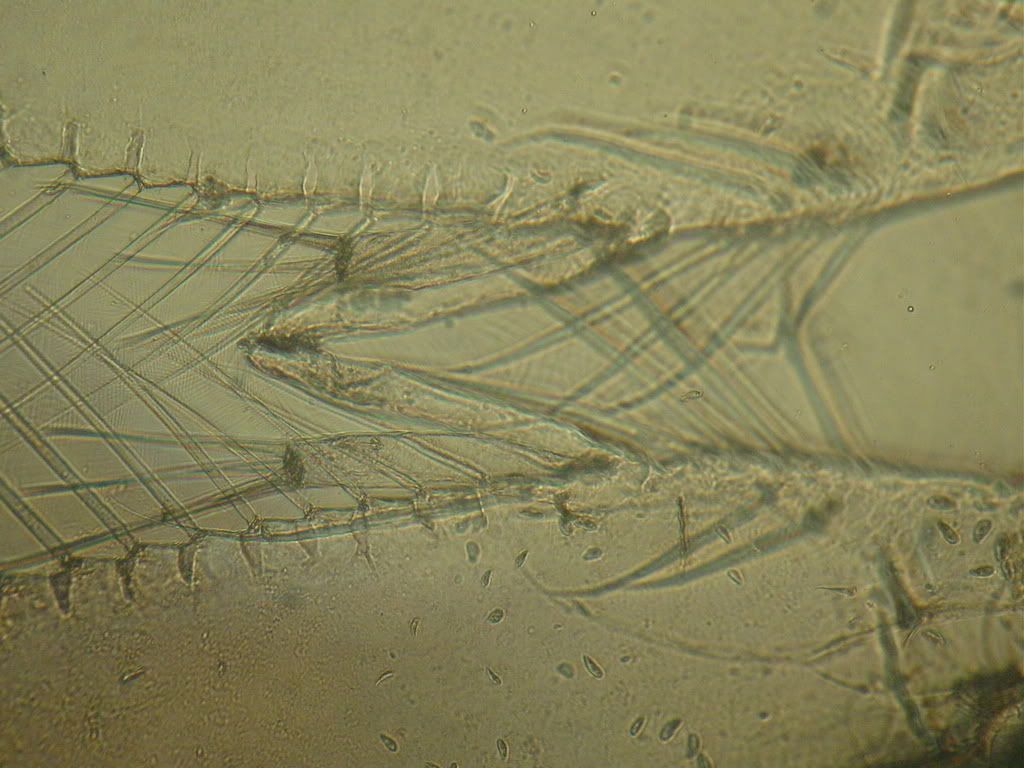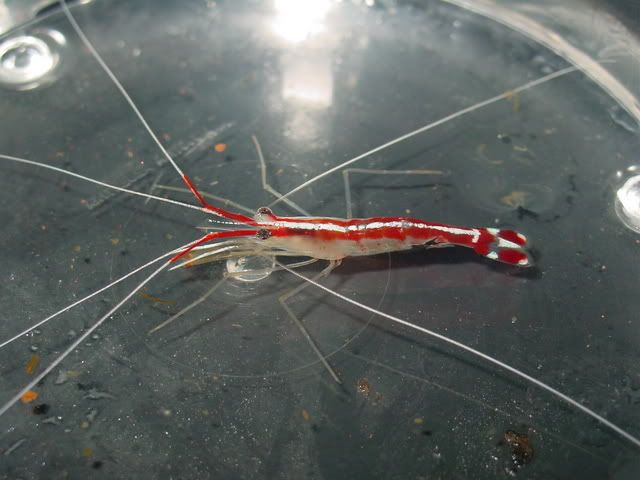

|
|
|
#101
|
|||
|
|||
|
Thank you all guys for the compliments
 After the larva was 120 days and kept molting and growing,without settling,it was everyday a tough decision if I should change something to provide a "settling cue",or stay put and wait for the best  .The worse days were these last,cause the larva didn´t molt 5 days after last molt as it used to,nor after 6days.Larvae that fail to molt die.Finally it molted after 7 days presenting me with this surprise .The worse days were these last,cause the larva didn´t molt 5 days after last molt as it used to,nor after 6days.Larvae that fail to molt die.Finally it molted after 7 days presenting me with this surprise Anderson,posso nao saber a sua idade,mas suspeito que voce nao e muito jovem tambem  Kevin,it is now a post larva (PL),which is basically a shrimp with a different colour.Some scientists object the use of "post larva" in this case,as they say there must be some larval structures retained,such as remnants of the "swimming legs"(pereiop.exop.) but I find that this term is useful for Lysmata shrimps which transform in something different from adults. FuEl,sure you do!What settling ages you had? Travis,no problem you can read the story from the beginning now 
__________________
Luis A M |
|
#102
|
|||
|
|||
|
Sorry,I´m working with the pic posting thing,but still find some technical problems
 You guys know a good place to store-upload pics?I filled up my RC library space. You guys know a good place to store-upload pics?I filled up my RC library space.
__________________
Luis A M |
|
#103
|
|||
|
|||
|
PhotoBucket.com
__________________
Travis Stevens |
|
#104
|
|||
|
|||
|
Hi Luis, mine settled around 150 days if I did'nt remember wrongly. Same experience with you, larvae died one by one till there is a sole survivor. This sole survivor then proceeded to metamorphose into a shrimp. I remember someone here in RC (can't remember the nick) forgot about his L.amboinensis larvae and it too, managed to metamorphose into a shrimp in the absence of other larvae. Perhaps these guys are like superworms, which can only metamorphose in the absence of other conspecifics or when maintained in very low densities.
Waikiki had success apparently with the use of high volume flow-thru natural seawater. Perhaps this prevented the build-up of stimuli which could inhibit metamorphosis (pheromones, excessive physical contact with other larvae, etc) which could possibly otherwise impede metamorphosis (unlike closed systems) . Just a wild guess of mine. 
__________________
Bred blood, skunk, peppermint and camel shrimps, sugar gliders, leopard geckos, Phelsuma standingi, Goniurosaurus hainanensis. Last edited by FuEl; 04/14/2007 at 07:54 AM. |
|
#105
|
|||
|
|||
|
Description of 1st day post meta while we wait for pics
 Red dorsal larval marks mostly vanished into a pale back,except for a bold mark where the body ends.Uropods remain as in larva,red marks in exops and endops.A1 are boldly banded in red up to proximal half,the rest is colourless.A2 are colourless pointing to the rear.The "Y" mark close to the mouth is red (white in adults).Bold red marks at the base of each pleopods. Each leg (pereiopod)is marked in red at the tips and in every joint,giving a red banded look.MP3 are colourless.There is only red pigment,no trace of white. The PL swings sideways exactly like peppermints.Adults only swing their MP3 (the white"legs" in the front) and antennae.The PL looks very different to adults and makes me think it could resemble an ancient Lysmata stock more close to actual peppermints.
__________________
Luis A M |
|
#106
|
|||
|
|||
|
WOW well done on getting him settled mate, cant wait for the pics!!
jamie |
|
#107
|
|||
|
|||
|
Luis, yo DA man!!
Woohoo! This is cool. You deserve it. I can't wait until you mass produce them......hehehe Best, Ilham |
|
#108
|
|||
|
|||
|
Congratulations!
__________________
--Andy "And chase the frothy bubbles, / While the world is full of troubles. . . ." --W. B. Yeats |
|
#109
|
|||
|
|||
|
White colour showed
unexpectedly on day 2 post meta.I wouldn´t think colour changes could come without a molt.Seems like the white pigment needed some time to develop.
Now the PL has a mid dorsal white band, still as a broken stripe,and white marks in the exopods as in adults.Also the telson and the MP3 are white.The antennae show a faint white colour. Tha PL is 25mm long (1"). Thanks to people sharing my insane excitement about this shrimpy! 
__________________
Luis A M |
|
#110
|
|||
|
|||
|
Quote:
__________________
Andy "If we knew what it was we were doing, it would not be called research, would it?" Albert Einstein |
|
#111
|
|||
|
|||
|
124 days
 This is the last picture of the larva.
__________________
Luis A M |
|
#112
|
|||
|
|||
|
And this is the PL,2 days after meta.,when the white colour appeared.Isn't it nice?
 
__________________
Luis A M |
|
#113
|
|||
|
|||
|
Wow Luis ! Now it lookks like a real shrimp !!!!!
Nice, very nice. Andeson.
__________________
"Posso năo saber de nada mas suspeito de muita coisa..." |
|
#114
|
|||
|
|||
|
Luis this thread has been an amazing read. I've been fascinated with the idea of raising Amboinensis for years now but I'd always heard that research on settlement cues needed to be done.
I wonder if you might do the community a favor and perhaps write up the husbandry steps you took with this latest batch (food, rearing tank setup, water changes, etc) or maybe a lessons learned article? Or perhaps you've already done something like this, if so I'd love to see it. Thanks again for such a detailed account.
__________________
"Quo usque tandem abutere, Catilina, patientia nostra?" |
|
#115
|
|||
|
|||
|
Thanks.Nice to know people like our work!
 I think that this subject of settling cues was very exaggerated with shrimps.The thing is to keep them alive until they reach the last stage and then they will settle.This is why I dragged everybody with the larval stages,they are like stations in a train trip,if you know them,you know how you´re going. I´ve tried many rearing protocols,what I did this time is in the thread.But try to find something better,raising one larva out of many hundreds is sure not the way 
__________________
Luis A M |
|
#116
|
|||
|
|||
|
Mark Wunsch (Bangor) was the first to raise L.amboinensis in 1996 and he wrote his doctoral thesis on it.
Since his monumental thesis is hard to obtain,I will put his methods and results here. He worked with three pairs of shrimps which produced six batches containing 2,150 larvae.Of these,he could raise only one to settling,after 142 days.Mine was 143!  He gave detailed description of the earlier larval stages.Larvae were kept in 2L flasks with air and fed artemia and later mussel flesh.Every one-two days water was changed and the flasks thoroughly cleaned.His method was very laborious.Air bubbles in the round flasks produced a kreisel like water movement which helped to keep the larvae in suspension.
__________________
Luis A M |
|
#117
|
|||
|
|||
|
Interesting Andy, guess its not about the inhibition of metamorphosis if you did get a few to settle together at a time. For the people who tried and only got one to settle out of hundreds or even thousands of larvae, I can only continue guessing what else they did differently.

__________________
Bred blood, skunk, peppermint and camel shrimps, sugar gliders, leopard geckos, Phelsuma standingi, Goniurosaurus hainanensis. |
|
#118
|
|||
|
|||
|
Wow, great work! It has been my main breeding goal to breed this species but I have only been able to reach 54 days so far. I am building a simple kreisel which I hope will increase my chances when I try it the next time (I feel that this species expend too much energy on catching it´s prey).
It seems like people has a lone survivor in the end which outsurvives the rest of the batch. This was the case for me as well when trying to breed them in small numbers in small containers. There was a sole survivor in each container that outlived the rest by a large margin, unfortunately not nearly all the way though. Is this only coincidence or do you think there is a reason for this? Someone already mentioned this and I only wanted to add my observations of a sole survivor. Could it be because there is not enough food in relation to water quality to support more than one individual? Is there some biological reason that they need to be alone to develop (que)? Could it be cannibalism? I have no idea but would I like to brainstorm the issue with you guys. If you could write an article and describe your setup/feeding regime/circulation etc on this it would be great! /Peter Last edited by The Cardinal; 04/25/2007 at 02:45 AM. |
|
#119
|
|||
|
|||
|
No,even if the idea is catchy,it is just coincidence.It only shows that our rearing protocols are marginal and sometimes one lucky larva (or 2,or)manages to make it.It happens with larval fish too.
A good larval rearing technique must allow the survival of a decent number of larvae,say 50%. Lysmata larvae eat dead ones but never prey on live Lysmata larvae. I tried many times and my last survival record was 99 days. I expect to be more successful next time,if my finding about hydroids proves true.
__________________
Luis A M |
|
#120
|
|||
|
|||
|
How will you minimize the chances of hydroids? Will you change water more frequently or use UV? Do you have any description on your setup or is this top secret?
 Do you think a kreisel/pseudokreisel could be a good idea when breeding this species? |
|
#121
|
|||
|
|||
|
I hate secrets and believe that we should all help each other to crack/improve breeding of marine species.I won´t conceal any experience or technique I develop.
But I can not pass information or papers given to me by other people as confidential without permission of the owners. I actually plan to write about the different crustacean larviculture approaches,including the technique I designed,in a larviculture forum I moderate elsewhere. Regarding hydroids,changing water doesn´t help as they are sessile.I use an UV but the bulb was burnt once and that possibly let them take over the system. You can scrap-siphon them out on a daily basis as they are very fast to come back.The best method was to move the larvae into a clean tank,but that was only possible when they were big and few 
__________________
Luis A M |
|
#122
|
|||
|
|||
|
Ok, that is a bit of a shame as I share your view that the whole community would benefit from a closer exchange of ideas. I hope you can ask for permission to release these "secrets" later on so we can start to exchange ideas and progress in the breeding of this species. I will let you know how the breeding with a kreisel works if you are interested (might be effective against hydroids for instance).
|
|
#123
|
|||
|
|||
|
How true!But the fact is that two of the researching groups will conceal jealously their findings
 .Academic researchers don´t want to lose the honour of their discoveries and commercial researchers don´t want to share the revenues of their successes .Academic researchers don´t want to lose the honour of their discoveries and commercial researchers don´t want to share the revenues of their successes Only hobbyists will share Only hobbyists will share .I´ve seen that so many times! .I´ve seen that so many times! A kreisel type device,like those used with medusae or seahorse fry should work well,as they keep the larvae in suspension easing their swimming effort.There is an on-line article about kreisels for Lysmata larvae,I think debelius.
__________________
Luis A M |
|
#124
|
|||
|
|||
|
Interst finding
that I want to share with you.Through this thread you heard about pleopods,appendix interna (AI)and appendix masculina (AM).
Well,now it´s time to further explain what they are and how they work in the post larval-adult stages of the shrimp. Pleopods are the swimmerettes,the fins under the pleon (abdomen,tail) that shrimps use for swimming and where eggs are attached.There are five pairs,and each one is split in two fins,the outer is the exopod and the inner the endopod. AI is a finger like process of the endopods with a Velcro like structure at the tip.With it,both AI,right and left can stick together allowing the four fins of each pleopod pair to paddle together as a single piece.The pics below show how that works.If it is not easy to see,I will put names and arrows with Photoshop,let me know.  and for a closer look:  Sorry,again XL pics,I´m new with Photobucket! Now the interesting thing.You see the banana shaped structure between the AI and the pleopod,with three large spines?.This is the AM,the male organ,which only shows in the 2nd pleop pair.It is well developed,about the same size of the AI,meaning that this "baby"is a male,perhaps fertile!  The natural story of Lysmata shrimps so far known (peppermints) is different.Juveniles don´t have any external sexual characters,later they develope gradually the AM and become males.At last the ovary developes,the AM dissapears and the shrimp becomes hermaphrodite. This shows that L.amboinensis settles in a PL not only much larger,but only more developed than the other species,skipping the inmature juvenile phase. It would be interesting (though risky  )to mate my shrimp with an adult,to check if it is fertile. )to mate my shrimp with an adult,to check if it is fertile.Now,if this shrimps settles with a full grown AM,it has to have developed during the last larval stages,exactly as Andy said above in this thread.
__________________
Luis A M |
|
#125
|
|||
|
|||
|
So you only like nice colorful pics...
 and not my boring pics of the shrimpy´s private parts or digressions about how they swim or the secrets of their sex life?  Well,here you´ve got it  Baby shrimp after his first molt and now virtually looking like an adult.That´s it,enjoy! Baby shrimp after his first molt and now virtually looking like an adult.That´s it,enjoy!
__________________
Luis A M |
|
|